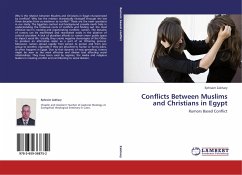Why is the relation between Muslims and Christians in Egypt characterized by conflicts? Why has the relation dramatically changed through the last three decades from co-existence to conflict? These are the main questions in our study. The Egyptian context and background provide much help in understanding the historical roots of conflicts and finding out the most effective tool in creating and regenerating conflicts: rumors. The dynamic of rumors can be manifested and reactivated easily in the absence of cultural pluralism. A lack of pluralism affords to rumors more public space to impact social life. Usually, they create negative stereotypes of the Other to produce an alternative vision as a part of an Othering process. Moreover, rumors spread rapidly from person to person and from one group to another, especially if they are attached to humor or funny jokes, as often happens in Egypt. Due to that dynamic of easy spreading, rumors might be seen as the most effective and divisive tool affecting social relationships. They have been used by regimes, the media and religious leaders in creating conflict and contributing to social division.
Bitte wählen Sie Ihr Anliegen aus.
Rechnungen
Retourenschein anfordern
Bestellstatus
Storno

